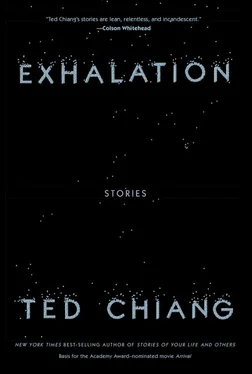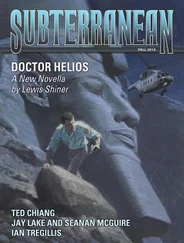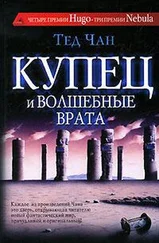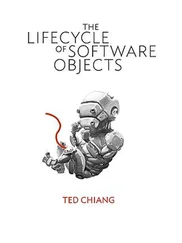Moseby explained to Jijingi how each sound a person spoke could be indicated with a different mark on the paper. The marks were arranged in rows like plants in a field; you looked at the marks as if you were walking down a row, made the sound each mark indicated, and you would find yourself speaking what the original person had said. Moseby showed him how to make each of the different marks on a sheet of paper, using a tiny wooden rod that had a core of soot.
In a typical lesson, Moseby would speak and then write what he had said: “When night comes I shall sleep.” Tugh mba a ile yo me yav. “There are two persons.” Ioruv mban mba uhar. Jijingi carefully copied the writing on his sheet of paper, and when he was done, Moseby would look at his paper.
“Very good. But you need to leave spaces when you write.”
“I have.” Jijingi pointed at the gap between each row.
“No, that is not what I mean. Do you see the spaces within each line?” He pointed at his own paper.
Jijingi understood. “Your marks are clumped together, while mine are arranged evenly.”
“These are not just clumps of marks. They are…I do not know what you call them.” He picked up a thin sheaf of paper from his table and flipped through it. “I do not see it here. Where I come from, we call them ‘words.’ When we write, we leave spaces between the words.”
“But what are words?”
“How can I explain it?” He thought a moment. “If you speak slowly, you pause very briefly after each word. That’s why we leave a space in those places when we write. Like this: How. Many. Years. Old. Are. You?” He wrote on his paper as he spoke, leaving a space every time he paused: Anyom a ou kuma a me?
“But you speak slowly because you’re a foreigner. I’m Tiv, so I don’t pause when I speak. Shouldn’t my writing be the same?”
“It does not matter how fast you speak. Words are the same whether you speak quickly or slowly.”
“Then why did you say you pause after each word?”
“That is the easiest way to find them. Try saying this very slowly.” He pointed at what he’d just written.
Jijingi spoke very slowly, the way a man might when trying to hide his drunkenness. “Why is there no space in between an and yom ?”
“ Anyom is one word. You do not pause in the middle of it.”
“But I wouldn’t pause after anyom either.”
Moseby sighed. “I will think more about how to explain what I mean. For now, just leave spaces in the places where I leave spaces.”
What a strange art writing was. When sowing a field, it was best to have the seed yams spaced evenly; Jijingi’s father would have beaten him if he’d clumped the yams the way Moseby clumped his marks on paper. But he had resolved to learn this art as best he could, and if that meant clumping his marks, he would do so.
It was only many lessons later that Jijingi finally understood where he should leave spaces and what Moseby meant when he said “word.” You could not find the places where words began and ended by listening. The sounds a person made while speaking were as smooth and unbroken as the hide of a goat’s leg, but the words were like the bones underneath the meat, and the space between them was the joint where you’d cut if you wanted to separate it into pieces. By leaving spaces when he wrote, Moseby was making visible the bones in what he said.
Jijingi realized that, if he thought hard about it, he was now able to identify the words when people spoke in an ordinary conversation. The sounds that came from a person’s mouth hadn’t changed, but he understood them differently; he was aware of the pieces from which the whole was made. He himself had been speaking in words all along. He just hadn’t known it until now.
· · ·
The ease of searching that Remem provides is impressive enough, but that merely scratches the surface of what Whetstone sees as the product’s potential. When Deirdre fact-checked her husband’s previous statements, she was posing explicit queries to Remem. But Whetstone expects that, as people become accustomed to their product, queries will take the place of ordinary acts of recall, and Remem will be integrated into their very thought processes. Once that happens, we will become cognitive cyborgs, effectively incapable of misremembering anything; digital video stored on error-corrected silicon will take over the role once filled by our fallible temporal lobes.
What might it be like to have a perfect memory? Arguably the individual with the best memory ever documented was Solomon Shereshevskii, who lived in Russia during the first half of the twentieth century. The psychologists who tested him found that he could hear a series of words or numbers once and remember it months or even years later. With no knowledge of Italian, Shereshevskii was able to quote stanzas of The Divine Comedy that had been read to him fifteen years earlier.
But having a perfect memory wasn’t the blessing one might imagine it to be. Reading a passage of text evoked so many images in Shereshevskii’s mind that he often couldn’t focus on what it actually said, and his awareness of innumerable specific examples made it difficult for him to understand abstract concepts. At times, he tried to deliberately forget things. He wrote down numbers he no longer wanted to remember on slips of paper and then burned them, a kind of slash-and-burn approach to clearing out the undergrowth of his mind, but to no avail.
When I raised the possibility to Whetstone’s spokesperson, Erica Meyers, that a perfect memory might be a handicap, she had a ready reply. “This is no different from the concerns people used to have about retinal projectors,” she said. “They worried that seeing updates constantly would be distracting or overwhelming, but we’ve all adapted to them.”
I didn’t mention that not everyone considered that a positive development.
“And Remem is entirely customizable,” she continued. “If at any time you find it’s doing too many searches for your needs, you can decrease its level of responsiveness. But according to our customer analytics, our users haven’t been doing that. As they become more comfortable with it, they’re finding that Remem becomes more helpful the more responsive it is.”
But even if Remem isn’t constantly crowding your field of vision with unwanted imagery of the past, I wonder if there aren’t issues raised simply by having that imagery be perfect.
“Forgive and forget” goes the expression, and for our idealized magnanimous selves, that is all you needed. But for our actual selves the relationship between those two actions isn’t so straightforward. In most cases we have to forget a little bit before we can forgive; when we no longer experience the pain as fresh, the insult is easier to forgive, which in turn makes it less memorable, and so on. It’s this psychological feedback loop that makes initially infuriating offenses seem pardonable in the mirror of hindsight.
What I feared was that Remem would make it impossible for this feedback loop to get rolling. By fixing every detail of an insult in indelible video, it could prevent the softening that’s needed for forgiveness to begin. I thought back to what Erica Meyers said about Remem’s inability to hurt solid marriages. Implicit in that assertion was a claim about what qualified as a solid marriage. If someone’s marriage was built on—as ironic as it might sound—a cornerstone of forgetfulness, what right did Whetstone have to shatter that?
The issue wasn’t confined to marriages; all sorts of relationships rely on forgiving and forgetting. My daughter, Nicole, has always been strong-willed; rambunctious when she was a child, openly defiant as an adolescent. She and I had many furious arguments during her teen years, arguments that we have mostly been able to put behind us, and now our relationship is pretty good. If we’d had Remem, would we still be speaking to each other?
Читать дальше









